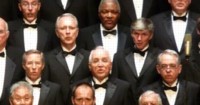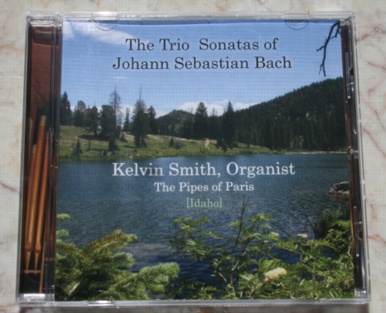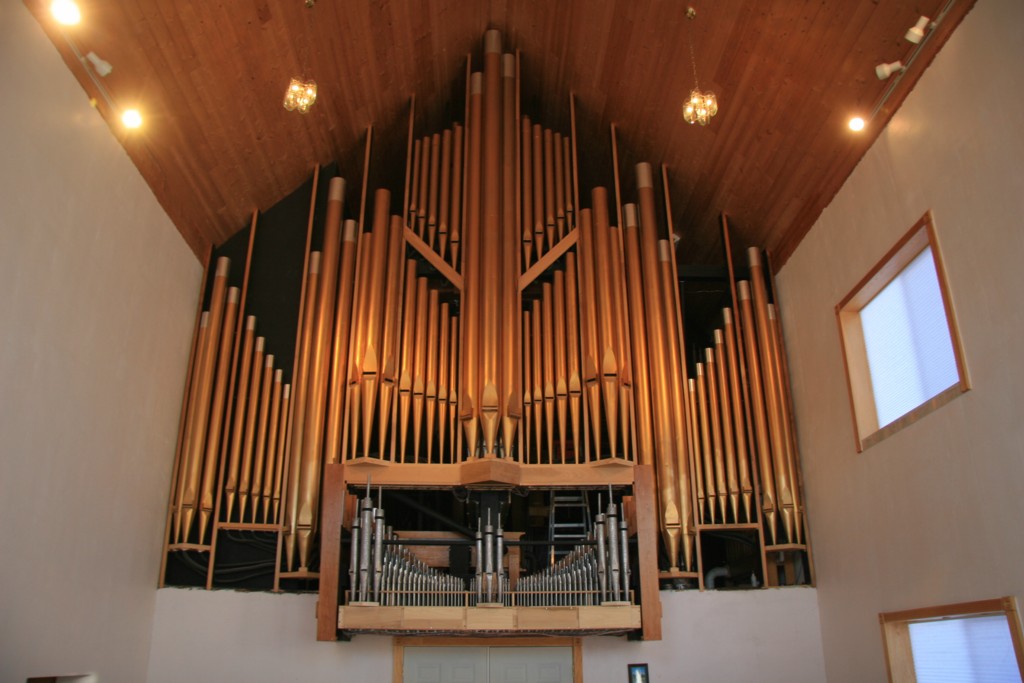The Sound of Organ Pipes

The pipe organ is the oldest keyboard instrument. An instrument still extant in Switzerland dates from 1435, and the earliest historical record of them comes from ancient Greece. The modern pipe organ is the produce of centuries of development and experimentation. It is in truth a collection of instruments, different kinds of pipes with their own characteristic timbres, available individually or in combinations, assigned to one of multiple keyboards. An organ of fifty stops doesn't just have fifty different sounds; the potential combinations becomes astronomical. Gifted composers like Johann Sebastian Bach, Cesar Franck and many others learned to use this tonal palette in immortal music that will be loved to the end of time.
Churches, the traditional home of pipe organs were generally spacious stone edifaces where sound echos for seconds after it is made. In the 20th century, organ also became popular in concert halls and in theaters in the age of silent movies. Organs in homes were limited in size and capability by available space and money. Organists who wanted to play the full repertoire of organ literature had to seek employment at an institution with the venue and funding for such an instrument, or settle for an electronic one, which can easily provide the stops, but never an authentic, professional quality of sound.
In the 21st century, the organ has lost its popularity, due in part to our desire for things that are new, and in part, no doubt, to the the preponderance of low-quality electronic instruments heard in so many churches. The decline of religion itself, is another factor. Sadly, many large, beautiful pipe organs are being removed from both churches and concert halls and another genre of worship has come into vogue. In this environment, Kelvin Smith opted to put organ music in his own home. The hall is no cathedral, but with a thirty-foot ceiling and 1100 square feet of floor space it provides some ambiance for the pipes to speak into. The organ is the largest pipe organ in Idaho, with around 5000 pipes. Both the home and the organ were built by Kelvin, details of which can be seen here. Read also about the Pipes of Paris Summer Recital Series.
Aside from the necessity of earning a living, which he did as a software engineer, Kelvin has devoted his life to preserving this tradition of organ music. Fad and fashion changes with the wind, but that which has real worth and meaning will still be there when the fads are forgotten. In addition to performing the traditional great organ works, Kelvin has transcribed many works from other instrumentations and composed numerous pieces of his own. A collection of recordings and scores of all these is found on this site.
Kelvin performs as a guest organist at Temple Square, in Salt Lake City, home of the famous Tabernacle Choir at Temple Square, (formerly known as the Mormon Tabernacle Choir), and the Salt Lake Tabernacle Organ, built by Aeolian-Skinner, one of the largest and most famous organs in the world. For over a hundred years, daily organ recitals have been performed for the many tourists that visit Temple Square, and he performs a number of these recitals each year.
Classical Music—A Language of Abstract Communication

Music ranks among the great achievements of Western Civilization. Its roots trace back to ancient Greece and early Christian chants as well as secular folk music. It was scientifically studied and developed and instruments were invented and painstakingly developed by skilled craftsmen. New notes needed to be added to the octave and difficult questions about tuning had to answered. Genius composers devoted their lives to exploiting the infinite varieties of possible sounds. Choirs of hundreds and even thousands of voices assembled and instruments weighing many tons were built. As in the apex of all great civilizations, masses of people turn up their noses at what came before, but those immerse themselves in music develop a deep appreciation for the wonder our musical heritage.
Classical music is a medium of communication, a sophisticated language in which feelings, emotions and abstract ideas are communicated. Sometimes music's meaning can expressed in words, sometimes it affects us differently as circumstances in life change, and frequently attempts to define its meaning fall far short of its real majesty. Rhythms, keys and modulations, themes and forms, tonal colors and textual effects, phrasing and the performer's interpretation all contribute to the musical experience. It transcends culture and creeds, political movements and fad and fashion.
As with all things of value, the power of music is experienced little with casual effort. Great music is full of details important to its effect at risk of going unperceived. An oration delivered in a foreign language could be full of passion and emotion, but those who don't understand the language would miss most of the meaning. Opening our ears to the details deepens the magic of the experience.





